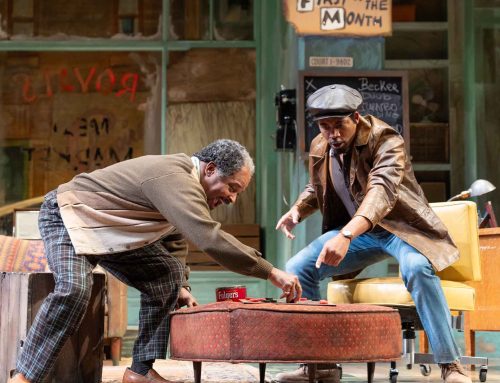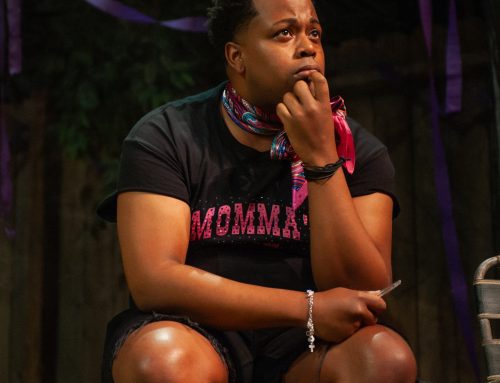at the Oregon Shakespeare Festival

Book, music, and lyrics by Meredith Wilson
Story by Meredith Wilson and Frank Lacey
I keep saying that I don’t like musicals. When I walked out of The Music Man grinning, humming, and full of “do you remember when Harold Hill…” comments, I thought I was on an unnatural high.
I was sure that after a day or so, the holes in the melodic fabric would appear, and I would become a happy, jaded nay-sayer again: “Well, there really is only one song in the whole show, you know.”
I assumed that a dramatic, more serious play would jolt me awake as the OSF season wore on. I would downgrade my five-star reaction to a suitable, sedate 3 or 4, and The Music Man would recede into its proper middle-of-the-pack place in the season’s rankings.
But no. It’s been close to two months since I saw the show. I have now attended all of the plays I bought tickets for and published my reviews. And, The Music Man is still on top in absolute quality and in first place in my 2009 Season list.
Under Director Bill Rauch, this heartwarming old chestnut actually had emotion, life, and teary-eyed heartwarming moments. Rauch keeps the pace fast and throws in light-hearted distractions that keep the evening from devolving into emotionally gooey pap. But, he exposes the small town goodness and let’s us revel in the basically happy story.
Rauch brings in lots of fun techniques which may not be unique, but are enriching nevertheless. For example, the set, clothes, and characters start off in black-and-white and gain vibrant color only after being touched by the hero/villain Hill. Yes, that device has been done elsewhere. But, it is a good device that adds to this production. I found myself checking the different townspeople to see if their clothes had color and if they had been won over by Hill.
This Music Man is all about small towns and their character. Its overture with the brassy trombone undercurrent is played quietly and plaintively on a solo harmonica by Robert Vincent Frank. What a head-straightening moment that cues you in that this isn’t your mother’s Music Man.
Well, actually, it is your mother’s Music Man. Or, at least my musical-crazy, know-all-the-lyrics husband’s Music Man. All of his favorite memory moments are there, only better. The songs and quick patter such as “But you gotta know the territory” are presented as dialog and not set pieces trotted out on the back of a pompous Broadway semi-truck.
There is a story and change and conflict and social commentary along with the 76 trombones. River City is not just a happy Disney place. Yes, the self-important Mayor Shinn (Richard Elmore) is over-the-top humorous, but not so over that there’s no connection with real-life small-town attitudes.
This is a difficult production to review. There is one gem moment after another, and I could walk through each scene saying, “I liked it — it was special”. The overture I praised above was followed by an accessible, captivating, and bright “Rock Island”. Which was followed by… the list of memorable moments goes on and on. The school board quartet, the “Sister, Sister” speech, … all the way through to the debut concert of the children’s band.
Harold Hill is spectacularly and sensitively played by Michael Elich. Elich’s energy and range deserve paragraphs on their own. Elich looks right, sounds right, and is high-watt electric and on every moment.
But, virtually the whole cast is better than flawless and deserves their own raves. Mrs. Shinn (Linda Alper), Mrs. Paroo (Demetra Pittman), Charlie Cowell (John Pribyl), Ewart Dunlop (Cristofer Jean), Alma Hix (Sarah Jane Nelson), and Olin Britt (Robert Vincent Frank) in any other production would have been inches of praise.
In this excellent version, I will comment only on two additional characters.
Marian the Librarian (Gwendolyn Mulamba) is the most talked-about casting choice, and, in my mind, one of the most applause-worthy. The script tells us that Marian doesn’t fit in with the rest of the town. She’s shunned, or at least avoided, for her high-class, high-culture ways. Mulamba conveys that isolation with a regal physical demeanor, careful clothes, calmness, and with a cultured singing voice. When the other town folk are phrasing their songs like the show tunes they are, Mulamba is clearer, more reserved, with a hint of classical chorus or opera. What she sings is not really foreign, but is it also not a familiar song from the radio.
Marian’s differentness, non-Iowaness, is what catches the con-artist Hill and throws him off his game. Her practical idealism is key to the entire show. In this OSF version, Mulamba is a complete, complex package which was brilliantly directed and acted. Yet many critics and play goers criticize Mulamba for just not fitting in with the rest of the cast. Hello? Marian doesn’t fit in. That’s why we have The Music Man to enjoy.
Marcellus Washburn (Howie Seago) is a townsman who is also a friend of Hill. This character evens out the action when Hill’s fraud starts unraveling, and his commentary helps the audience understand the chase and drama about to unfold. Seago is a deaf actor. Any lines and explanations the audience needs to hear have to be spoken by another character. OSF’s solution is to have Seago sign his story, and a hearing actor gives the lines as if that actor is confirming his or her ability to read sign.
This mechanism works wonderfully in The Music Man, as Seago’s body gives extra emphasis to the parts of the story, and the reading of sign language and the spoken repetition heightens the small-town community feeling. The anachronistic signing and the full inclusion of a deaf person into town life hugely enhances the tight community feeling that Rauch is creating on stage. Seago’s acting also takes a part of 2009 back into River City and helps this Music Man feel less stuck-in-time and outdated. Rauch’s casting was not just politically correct and “good”, it was good theater.
Okay, I admit it. Musical or not musical is not the key.
I like good theater, and sometimes — very, very occasionally — good theater occurs when there is also music on stage. That’s what’s happening at OSF’s The Music Man.
Ozdachs Rating: ![]()





But it’s still The Music Man. And it’s still a play with essentially two main characters and a whole bunch of chorus boys and girls. I go to Ashland because I want to see actors performing their craft, not singers and dancers. It scares me to think of OSF moving in the direction of hiring on the basis of musical ability rather than acting ability.
If Bill Rauch is so insistent on performing a musical, at least present one that gives the audience a little bit of an emotional challenge. Not this powder puff.
Did you see the Ashland production?
I’m pretty sure I saw the same show you did. . . .
My complaint isn’t in the production. My complaint is whether this is the direction that I want OSF to be going. I have way too many opportunities to see musicals, and I don’t need to go to Ashland to scratch that itch. If the production provided some new interpretation of the work, or some interesting production technique (e.g. the recent Sweeney Todd at ACT), I would have been satisfied. But apart from the overture, this was a well-acted, well-sung vanilla production. OSF’s mission statement is to provide “…illuminating interpretations of new and classic plays.” This was neither.
On the other hand, I’m told you skipped “Servant of Two Masters”. I hope you change your mind. I’d happily see this again and again. OSF successfully took an old art form, la commedia dell’arte, and made it accessible to modern audiences.
Wow. I disagree!
This was not a brassy, happy excuse for one production number after another. This was a story told, in part, with music.
Our mutual anti-musical women friends and I came to the show expecting to be justified in our disdain for a “common” musical. Instead we were surprised and captivated by the unexpected vision.
To me, this was a classic OSF rescuing of a shop-worn, over-exposed piece of theater.
I hope it did well financially. At least enough that the hopes and dreams of the actors won’t be quashed by the buzz of bankruptcy.
It’s a crowd pleaser and booked solid, if not sold out. Rumors are that the Festival overall is in the black this year, too.
Great review of this marvelous production. Tim and I have seen it three times so far and will see it at least once more before it closes.